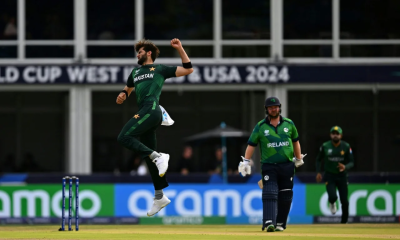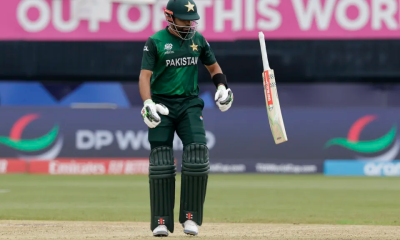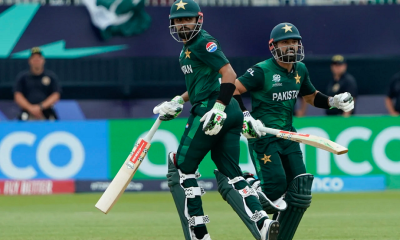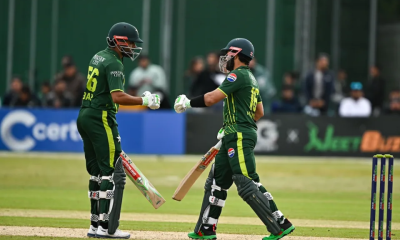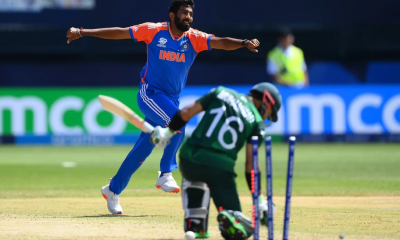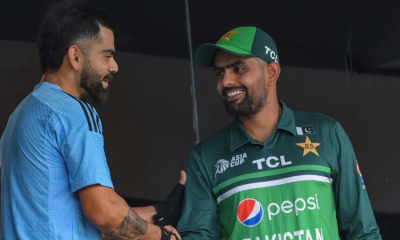Features
Same old troubles, Pakistani elections
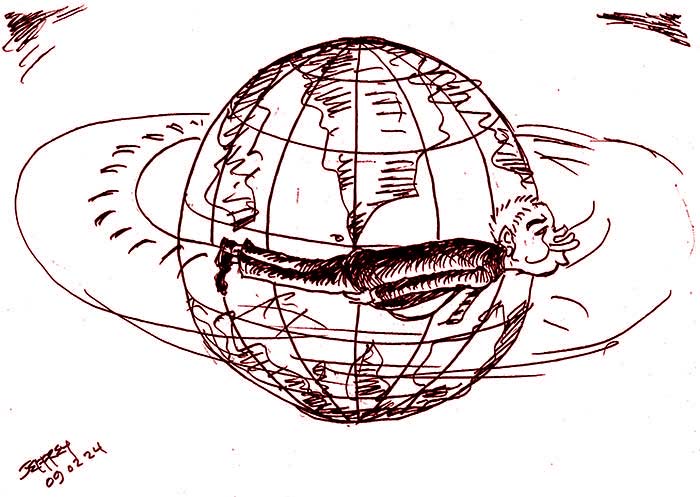
 Nothing seems to have changed for the better in the isle we struggle to exist in. Prices of all goods are very high; even middle-class families are falling below the poverty line; most politicians, particularly the self-seekers, are living grand and not departing from their usual tricks; strikes by various groups staged constantly; the President indulges in globetrotting; media is being suppressed.
Nothing seems to have changed for the better in the isle we struggle to exist in. Prices of all goods are very high; even middle-class families are falling below the poverty line; most politicians, particularly the self-seekers, are living grand and not departing from their usual tricks; strikes by various groups staged constantly; the President indulges in globetrotting; media is being suppressed.
Thick skinned medical criminal
The only dimly bright spot is that tourists are visiting this country in large numbers. We hope among them are at least a few high spenders, but even the others do bring in foreign currency.
Another bright spot is the at-last handcuffing of the ex-Minister of Health though of course given VIP treatment even in Welikada – straight to greater freedom in the prison hospital and with home food supplied. Maybe, just maybe, in his solitude away from powerful protectors, security personnel and sycophants, sunk in comfort, his eye may see prison walls and a stark immediate future. His mind may turn to reflect on things past and he may ponder why he is incarcerated though with comfort assured unlike other prison inmates.
Then it may be that visions of past deeds will pass through his mind: how as Minister of Health he submitted papers to the Cabinet reporting falsely a shortage of drugs looming ahead of perpetually ill Sri Lanka. He is given the green light to go to India and do emergency purchasing while there really was no shortage. Medicines, etc., are ordered in bulk by him and by others under his very eye, which should have remained open.
A consignment of fake immunoglobulin is procured. He may see patients writhing in pain after being injected and die when they could have been easily cured. They died to pump illicit money into doctors’ and administrators’ pockets, ranging from the highest – himself? Yet again, his skin being so crocodile thick and his mind so grossly insensitive, he may be mentally counting his money stashed safely here and there. Not a spasm of guilt or regret or fear of the hereafter. He had the audacity to say that not all people who entered hospitals recovered, and that was why there were funeral parlours near hospitals.
Merciless, pigheaded strikers
Don’t people in this country realize that we are bankrupt and a failed state with an economy that has hit rock bottom? Of course, they do. Some families do with no extra food items, new clothes or bits of entertainment. Other families have just one meal a day; some even only scraps every day. Babies cry for milk and malnourishment visits homes like Death itself, enmeshing children for life. We who can afford three meals a day and to maintain certain standards in life are well aware of the suffering of people, so that our minds are not at peace; there resides no hope in hearts.
However, there are Sri Lankans who do not realize how low our country has sunk when it could very well have been a wonderful country full of resources and with happy, healthy, clever citizens. Who are these utterly insensitive and self-centered people? Many VIPs one can shout out. Politicians next. And work strikers will be the third shout to be immediately followed by the scream – particularly health workers. At the time of writing, health workers belonging to 72 trade unions: nurses, midwives, pharmacists et al., who are employees of the health sector, are on a prolonged strike.
Demanding what? Enhanced allowances added to their salaries. From whom do they demand extra payment? From the government which is bankrupt and just beginning to collect some money with repayment of loans menacingly looming in the near future. Even little kindergarten children know this truth. So surely these strikers know it too.
Do they want money printed with all its inherent dangers? Didn’t previous governments pander to spendthrift leaders with huge egos who wanted to perpetuate their names by constructing colossal buildings; ensured luxury living for MPs; acceded to voters’ demands and printed money? That alone pushed us over the precipice of economic stability.
To cap it all rumours float that President Wickremesinghe is bent on not holding elections. He has sunk in people’s opinion from Mr Clean. They gave this dishonor to Prez Sirisena who changed political partners by dishing MR and joining RW, then electing MR as PM over RW’s rightful claim to the post. Now, they say the nephew has surpassed the Old Fox. So very sad that many of us had hopes in this educated, well-read son of a prestigious and upright family to be the statesman we longed for and sorely needed. Our hopes have been dashed.
Political situation in Pakistan
In the February 8 elections in Pakistan, Imran Khan’s P.T.I. backed candidates won 91 seats, Nawaz Sharif’s PML-N won 76 and the PPP Party headed by Arif Ali Zardari in which his son, Bilawil Bhutto Zardari contested, gained 54 seats of the total 265.
Imran Khan and wife Bibi are in prison on many charges brought against Khan mostly. His created party Tehehreek-e-Insaf – P.T.I. – was barred from contesting since the EC condemned the party as incorrectly registering itself. Mainly through social media, party members and others rallied round and as seen from results gained most votes; people voting for more democracy and less military control. However, the tide has turned against the winning party with a coalition government being worked out between the PML-N and PPP coming together.
It was earlier said that Zardari was rooting for his son to be PM. However as of Wednesday February 14, the Prime Minister is to be Nawaz Sharif’s younger brother – Shehbaz Sharif, 72 of age, and a rich businessman dealing mainly with steel. Foreign newscasts showed Nawaz Sharif’s daughter very prominently beside her father. Maybe she was suggested as the coalition’s leader but seems to have had to make way for her uncle.
Most expected the PML-N to win a majority easily as it is backed by the military, “which has frequently engineered electoral outcomes. In a stunning upset, candidates allied with Imran Khan routed the two longstanding major parties, defying months-long military crackdown on their own party and delivering a sharp rebuke to the country’s generals.” Another foreign newspaper noted: “After days of wrangling, the parties run by political dynasties, joined forces and will nominate Shehbaz Sharif as PM. P.T.I. accused the military of vote tampering and forming a government with stolen votes.”
Arif Ali Zardari, widower of slain Benazir Bhutto, is tipped to be President of the country, which he earlier was from 2008 to 2013.There are significant similarities between Pakistan and Sri Lanka, more than similarities that exist between this country with other South Asian nations. Dissimilarities too are many. One major one is that Pakistan still has a democratic, loyal and honest politician in Imran Khan. Whom has Sri Lanka got? No one as of now.
There are many honest and loyal and selfless MPs and politicians, but a potential statesman as Imran Khan is, is nowhere to be seen. Fortunes of even nations change. Nothing is permanent. Thus, many Pakistanis, the young more especially, await the day when the military is made to lose its all-encompassing power and Imran Khan is free to come forth to lead his country to greater prosperity. We in Sri Lanka are without any hope.
Features
Kashmir terror attack underscores need for South Asian stability and amity

 The most urgent need for the South Asian region right now, in the wake of the cold-blooded killing by gunmen of nearly 30 local tourists in Indian-administered Kashmir two days back, is the initiation of measures that could ensure regional stability and peace. The state actors that matter most in this situation are India and Pakistan and it would be in the best interests of the region for both countries to stringently refrain from succumbing to knee-jerk reactions in the face of any perceived provocations arising from the bloodshed.
The most urgent need for the South Asian region right now, in the wake of the cold-blooded killing by gunmen of nearly 30 local tourists in Indian-administered Kashmir two days back, is the initiation of measures that could ensure regional stability and peace. The state actors that matter most in this situation are India and Pakistan and it would be in the best interests of the region for both countries to stringently refrain from succumbing to knee-jerk reactions in the face of any perceived provocations arising from the bloodshed.
The consequences for the countries concerned and the region could be grave if the terror incident leads to stepped-up friction and hostility between India and Pakistan. Some hardline elements in India, for instance, are on record in the international media as calling on the Indian state to initiate tough military action against Pakistan for the Kashmiri terror in question and a positive response to such urgings could even lead to a new India-Pakistan war.
Those wishing South Asia well are likely to advocate maximum restraint by both states and call for negotiations by them to avert any military stand-offs and conflicts that could prove counter-productive for all quarters concerned. This columnist lends his pen to such advocacy.
Right now in Sri Lanka, nationalistic elements in the country’s South in particular are splitting hairs over an MoU relating to security cooperation Sri Lanka has signed with India. Essentially, the main line of speculation among these sections is that Sri Lanka is coming under the suzerainty of India, so to speak, in the security sphere and would be under its dictates in the handling of its security interests. In the process, these nationalistic sections are giving fresh life to the deep-seated anti-India phobia among sections of the Sri Lankan public. The eventual result will be heightened, irrational hostility towards India among vulnerable, unenlightened Sri Lankans.
Nothing new will be said if the point is made that such irrational fears with respect to India are particularly marked among India’s smaller neighbouring states and their publics. Needless to say, collective fears of this kind only lead to perpetually strained relations between India and her neighbours, resulting in regional disunity, which, of course would not be in South Asia’s best interests.
SAARC is seen as ‘dead’ by some sections in South Asia and its present dysfunctional nature seems to give credence to this belief. Continued friction between India and Pakistan is seen as playing a major role in such inner paralysis and this is, no doubt, the main causative factor in SARRC’s current seeming ineffectiveness.
However, the widespread anti-India phobia referred to needs to be factored in as playing a role in SAARC’s lack of dynamism and ‘life’ as well. If democratic governments go some distance in exorcising such anti-Indianism from their people’s psyches, some progress could be made in restoring SAARC to ‘life’ and the latter could then play a constructive role in defusing India-Pakistan tensions.
It does not follow that if SAARC was ‘alive and well’, security related incidents of the kind that were witnessed in India-administered Kashmir recently would not occur. This is far from being the case, but if SAARC was fully operational, the states concerned would be in possession of the means and channels of resolving the issues that flow from such crises with greater amicability and mutual accommodation.
Accordingly, the South Asian Eight would be acting in their interests by seeking to restore SAARC back to ‘life’. An essential task in this process is the elimination of mutual fear and suspicion among the Eight and the states concerned need to do all that they could to eliminate any fixations and phobias that the countries have in relation to each other.
It does not follow from the foregoing that the SAARC Eight should not broad base their relations and pull back from fostering beneficial ties with extra-regional countries and groupings that have a bearing on their best interests. On the contrary, each SAARC country’s ties need to be wide-ranging and based on the principle that each such state would be a friend to all countries and an enemy of none as long as the latter are well-meaning.
The foregoing sharp focus on SAARC and its fortunes is necessitated by the consideration that the developmental issues in particular facing the region are best resolved by the region itself on the basis of its multiple material and intellectual resources. The grouping should not only be revived but a revisit should also be made to its past programs; particularly those which related to intra-regional conflict resolution. Thus, talking to each other under a new visionary commitment to SAARC collective wellbeing is crucially needed.
On the question of ties with India, it should be perceived by the latter’s smaller neighbours that there is no getting away from the need to foster increasingly closer relations with India, today a number one global power.
This should not amount to these smaller neighbours surrendering their rights and sovereignty to India. Far from it. On the contrary these smaller states should seek to craft mutually beneficial ties with India. It is a question of these small states following a truly Non-aligned foreign policy and using their best diplomatic and political skills to structure their ties with India in a way that would be mutually beneficial. It is up to these neighbours to cultivate the skills needed to meet these major challenges.
Going ahead, it will be in South Asia’s best interests to get SAARC back on its feet once again. If this aim is pursued with visionary zeal and if SAARC amity is sealed once and for all intra-regional friction and enmities could be put to rest. What smaller states should avoid scrupulously is the pitting of extra-regional powers against India and Pakistan in their squabbles with either of the latter. This practice has been pivotal in bringing strife and contention into South Asia and in dividing the region against itself.
Accordingly, the principal challenge facing South Asia is to be imbued once again with the SAARC spirit. The latter spirit’s healing powers need to be made real and enduring. Thus will we have a region truly united in brotherhood and peace.
Features
International schools …in action

 The British School in Colombo celebrated the 2025 Sinhala and Tamil New Year with the traditional rites and rituals and customs unique to the island nation, during a special Avurudu Assembly held at the school premises.
The British School in Colombo celebrated the 2025 Sinhala and Tamil New Year with the traditional rites and rituals and customs unique to the island nation, during a special Avurudu Assembly held at the school premises.
Students from all over the world, who are part of The British School in Colombo, gathered to celebrate this joyous event.
The special assembly featured traditional song and dance items from talented performers of both the Junior and Senior Schools.
On this particular day, the teachers and students were invited to attend school in Sri Lankan national costume and, among the traditional rituals celebrated, was the boiling of the milk and the tradition of Ganu-Denu.

Boiling of
the milk
In the meanwhile, a group of swimmers from Lyceum International School, Wattala, visited Australia to participate in the Global-ISE International Swimming Training Programme in Melbourne.
Over the course of 10 days, the swimmers followed an advanced training schedule and attended sessions at the Melbourne Sports and Aquatic Centre (MSAC), Victoria’s Nunawading Swimming Club, and Camberwell Grammar School.
In addition to their training, the group also explored Melbourne, with visits to key landmarks, such as the Parliament House and the Melbourne Cricket Ground (MCG), along with city tours and cultural experiences.

Traditional dance item

Tug-of-war contest

On arrival in Melbourne, Lyceum International School, Wattala, with Sri Lankan officials
Features
Perfect … and healthy

 Got a few more beauty tips to give you … for a perfect complexion, or, let’s say, a healthy skin.
Got a few more beauty tips to give you … for a perfect complexion, or, let’s say, a healthy skin.
* Honey Face Mask:
Take a tablespoon of raw honey and then warm it up by rubbing it with your fingertips. Apply the warm honey all over your face. Let this natural mask stand for about 10 minutes and then wash it off gently with warm water.
* Coconut Milk Face Mask:
You need to squeeze coconut milk out of a grated raw coconut and apply this milk all over your face, including your lips.
(This will help you gain a glowing skin. It is one of the best natural tips for skin care)
* Orange, Lemon, and Yoghurt Moisturiser:
To prepare this moisturiser, you need a tablespoon of orange juice, a tablespoon of lemon juice and a cup of plain yoghurt.
Mix them together and apply the paste all over your face, leaving it as a mask for 10 to 15 minutes. Next, take a damp handkerchief and use it to clean your face.
(This moisturiser brightens the complexion of your skin)
* Cucumber and Lemon:
Apply equal parts of cucumber and lemon juice on your face before taking a bath. Allow it to sit for 10 minutes before rinsing it off. This natural face beauty tip will brighten your skin tone and lighten blemishes if used on a regular basis. The best aspect is that it is appropriate for all skin types!
* Healthy Diet:
Aside from the effective home remedies, there are certain other factors to consider for skin care – and the first of them is your diet. Without the right nutrients, your skin cannot reverse the damage it suffers every day.
Eat fruits that are high in vitamin C because they contain antioxidants.
Adjust your diet to get the right amount of protein and unsaturated fats, as well as fresh green vegetables. All of this provides the right amount of nutrients so your skin can heal and improve itself naturally.
* Sun Protection and Care:
Another thing to keep in mind is not to step out of your home without sunscreen, especially with this awful heat we are experiencing at the moment. The hard rays of the sun can do you more damage than you could ever imagine.
By the way, you can prepare your own sunscreen lotion with glycerin, cucumber juice and rose water. You can also keep this lotion in the fridge.
-

 Business5 days ago
Business5 days agoDIMO pioneers major fleet expansion with Tata SIGNA Prime Movers for ILM
-

 News4 days ago
News4 days agoFamily discovers rare species thought to be extinct for over a century in home garden
-

 Features6 days ago
Features6 days agoProf. Lal Tennekoon: An illustrious but utterly unpretentious and much -loved academic
-

 Foreign News5 days ago
Foreign News5 days agoChina races robots against humans in Beijing half marathon
-

 Features2 days ago
Features2 days agoRuGoesWild: Taking science into the wild — and into the hearts of Sri Lankans
-

 Editorial5 days ago
Editorial5 days agoSelective use of PTA
-

 News2 days ago
News2 days agoOrders under the provisions of the Prevention of Corruptions Act No. 9 of 2023 for concurrence of parliament
-

 Features4 days ago
Features4 days agoThe ironies of history



